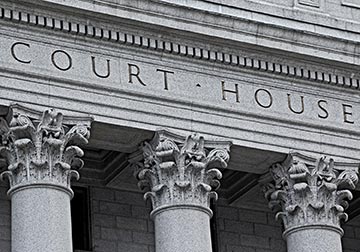Providence Rhode Island Governmental Liability Lawyers
Providence Federal Tort Claims Act attorneys and Providence Rhode Island Government Tort Claims attorneys can handle your lawsuit against the government, whether you are suing the federal government, state government, or local government.

Rhode Island Governmental Tort Claims Lawyers - Government Liability Lawyers Serving Metro Providence Residents Injured by the State or Municipal Government
An old Latin adage advises "Rex non potest peccare" or, in English, "The King can do no wrong." This saying expresses the Old World notion that the ruling class was essentially immune from any liability and could reign as they wished, breaking any laws they saw fit. In fact, at English common law, it was impossible to sue the Sovereign or King for redress. Since every state in the United States — with the notable exception of Louisiana — adopted the English common law, it was also historically impossible for a Providence, RI resident or any other Rhode Island citizen to sue the City of Providence, Providence County, or the State of Rhode Island. In other words, no government liability existed whatsoever.
Of course, much has changed since our country's modest beginnings. The Rhode Island legislature adopted the Governmental Tort Claim Laws which are now found in Rhode Island Laws, Title 9 Chapter 31. Prior to the enactment of this Act, Providence residents would have been completely barred from suing the Rhode Island government for any harms it inflicted upon them.
The Rhode Island Governmental Liability laws allow residents to bring claims against the State of Rhode Island. According to the statutes, "The state of Rhode Island and any political subdivision thereof, including all cities and towns, shall, subject to the period of limitations set forth in § 9-1-25, hereby be liable in all actions of tort in the same manner as a private individual or corporation (9-31-1. Tort liability of state)."
Recover against the State of Rhode Island, or any subdivision, such as the City of Providence "shall not exceed the sum of one hundred thousand dollars ($100,000) (9-31-2. Limitations of damages--State)," except in some limited circumstances.
In order to make sure you comply with these requirements, contact a Providence government liability lawyer to discuss your claim.
Thus, if you have been injured by a city or county employee, it is important that you contact a governmental liability lawyer. A Providence governmental liability attorney will know whether you have a cause of action arising from either a state law mandating waiver of sovereign immunity or through a waiver of immunity by the City of Providence or one of its counties. If, however, there is no state mandated waiver or city or county waiver, then sovereign immunity will act as a complete bar to any recovery.
Federal Tort Claims Act Lawyer - Serving Metro Providence Residents Injured by the Federal Government
Just like the Rhode Island government, the Federal Government traditionally enjoyed sovereign immunity, so those injured by federal government actions could not sue to recover damages. However, the federal government was the largest employer in the United States and many injured employees of the federal government demanded compensation. In addition, many people not employed by the federal government were also being injured by it and they too demanded compensation. For example, if a federal government employee was negligently driving a car down Peachtree Street and injured a Providence resident, that person would likely have sought damages from the federal government to compensate them for their injuries. This is just one example of a myriad of ways in which the issue of federal government liability arose over the years. It became clear that sovereign immunity had become outmoded, and, in 1946, Congress passed the Federal Tort Claims Act (FTCA). The FTCA is similar in nature to the Rhode Island Tort Claims Act; however, there are some key differences. Some important points concerning the FTCA include:
- Prior to filing suit under the FTCA, a claimant must present his claim to the federal agency out of whose activities the claim arises. 28 U.S.C. Sec. 2675;
- This must be done within two years after the claim accrues. 28 U.S.C. Sec. 2401.14;
- If, within six months after receiving a claim, the agency mails a denial of the claim to the claimant, then the claimant has six months to file suit in federal district court. 28 U.S.C. Sections 2401, 2675;No period of limitations applies to a plaintiff if the agency fails to act within six months after receiving his claim;
- Suits under the FTCA are tried without a jury. 28 U.S.C. Section 2402;
- An agency may not settle a claim for more than $25,000 without the prior written approval of the Attorney General or his designee;
- United States attorneys are authorized to settle claims in amounts up to $1 million;
- Attorneys who represent claimants under the FTCA may not charge claimants more than 25 percent of a court award or a settlement made by the Attorney General or his designee after suit is filed, or more than 20 percent of a settlement made by the agency with whom a claim is filed. 28 U.S.C. Section 2678; and
- A court may not order the United States to pay a claimant's attorneys' fees unless the court finds the United States to have acted in bad faith. 28 U.S.C. Sec. 2412(b).
For further clarification on how the Federal Tort Claims Act and the Rhode Island waiver of sovereign immunity compare, and advice on how to proceed in your case, please contact a Providence Governmental Liability lawyer.
Exceptions to the FTCA
There are three (3) main exceptions to the FTCA. They are:
- The Feres doctrine. This doctrine prohibits lawsuits by military personnel for injuries sustained "incident to service";
- The discretionary function exception; and
- The intentional tort exception.
The FTCA applies to many government employees that are injured. For example, postal workers in Providence are often injured and seek the help and advice of Providence Postal Service injury lawyers. A variety of other government employees and private residents of Greater Providence, Providence County, and surrounding areas in Rhode Island may also be injured by actions of either the federal, state, or municipal government. If you, or a loved one, have suffered an injury due to the negligence of the government, or while on the job as a government employee, call one of the Providence governmental liability lawyers on this page for a free consultation.
|
Read the full text of Rhode Island's Governmental Tort Liability Laws |
Government Liability Attorneys Serve Metro Providence and Surrounding North Rhode Island Communities
Serving clients throughout Eastern New Hampshire, including Allenton, Ashaway, Attleboro, Bayside, Boston, Bradford, Cambridge, Chepachet, Cranston, Cumberland Hill, East Greenwich, Exeter, Fort Ninigret, Greenville, Harrisville, Hartford, Hope Valley, Kingston, Misquamicut, New Haven, Nooseneck, North Scituate, North Swansea, Pawtucket, Perryville, Providence, Rumford, Shannock, Springfield, Usquepaug, Valley Falls, Wakefield, Warwick, Washington, West Warwick, Westerly, Wood River Junction, Woonsocket, Worcestor, areas in the vicinity of Theodore Francis Green Memorial State Airport, and other communities in Providence County.
Call a Providence government liability claims attorney today to pursue your case against the government.